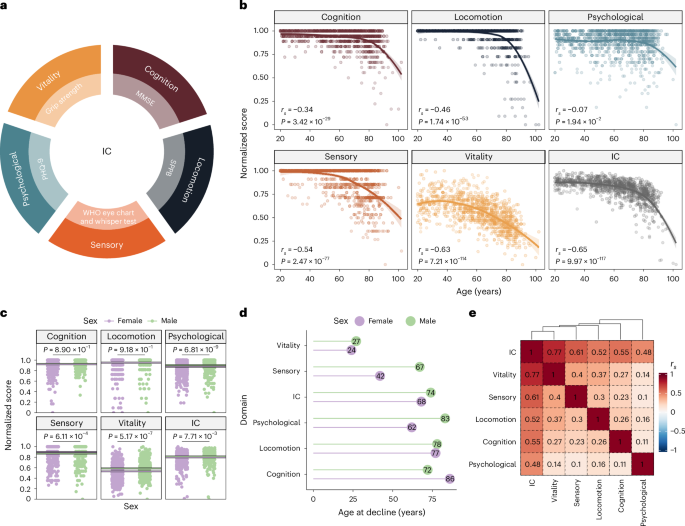
- Past studies show there are many things that people can do to help them age healthier, such as eating a healthy and balanced diet.
- A new study found that dietary fiber and the quality of carbohydrates consumed during midlife can have a major impact on healthy aging for older women.
- The findings indicated that high quality carbohydrates from sources such as whole grains, vegetables, and legumes, and total dietary fiber was linked to up to a 37% better chance of healthy aging.
Everyone everywhere is on a mission to age in the healthiest way possible.
“Aging healthily is important for older adults to lead fulfilling and independent lives and to fully engage in many personal and family activities,” Andres Ardisson Korat, ScD, scientist II at the Jean Mayer USDA Human Nutrition Research Center on Aging (HNRCA) at Tufts University in Massachusetts, told Medical News Today. “To do this, older adults benefit from being free of major chronic diseases, preserving good physical and cognitive function, and keeping good mental health status.”
“Additionally, any limitations or disabilities place care-giving burdens on loved ones/family members, and are costly to manage (i.e., the cost of medical visits, medications, caregivers, etc.),” Ardisson Korat continued. “These limitations add up in terms of loss of productive time and added medical and treatment costs.”
Ardisson Korat is the lead author of a new study that offers more insight on what to eat to age healthily. He and his team found that how much dietary fiber and the quality of carbohydrates consumed during midlife can have a major impact on healthy aging for older women.
For this study, researchers analyzed diet and health data from more than 47,000 women who completed the Nurses’ Health Study questionnaires between 1984 and 2016. By 2016, participants ranged in age from 70 to 93.
Scientists included data on each participant’s dietary fiber intake and evaluated the types of total amount of carbohydrates participants consumed and their quality:
“Carbohydrates contribute about half of our total calorie intake, and come in many different forms (i.e., refined, complex, simple sugars, dietary fiber) and from many sources (refined grains, added sugars, fruits, vegetables, whole-grains, potatoes, etc.) with many health implications,” Ardisson Korat explained.
“We know that consumption of different types of carbohydrates has implications in the risk of developing and dying from many chronic diseases; however, they [have] not examined the role of dietary carbohydrates and carbohydrate quality in healthy aging,” he added.
At the study’s conclusion, researchers found that focusing on eating high-quality carbohydrates from whole grains, fruits, vegetables, and legumes, and total dietary fiber in midlife, correlated to a 6-37% better chance of healthy aging.
“Consuming high quality carbohydrates, those from fruits, vegetables, whole grains, and legumes, can increase our likelihood of aging healthily,” Ardisson Korat said. “What’s more, consuming carbohydrates from these sources increases our chances of avoiding chronic diseases and preserving good physical and cognitive function into older adulthood.”
Scientists also found that eating more refined carbohydrates led to a 13% lower chance for healthy aging and eating more starchy vegetables — such as potatoes and corn — led to a 10% lower chance.
“Dietary carbohydrate quality is important for healthy aging,” Ardisson Korat explained. “Our study showed that consuming high quality carbohydrates is favorably linked with healthy aging, and on the same line, consuming carbohydrates from refined sources (i.e., refined grains, added sugars) is linked to lower chances of becoming a healthy ager.”
High quality vs. refined carbs
“What’s more, in this study, we looked at the relationship between increasing high-quality carbohydrates while decreasing refined carbohydrates (in a substitution analysis) with healthy aging. We found that this replacement — more high-quality carbohydrates, less refined carbohydrates — is associated with 16% higher likelihood of becoming a healthy ager.”
— Ardisson Korat, lead author
MNT spoke with Sheryl Ross, MD, a board certified OB/GYN and Women’s Health Expert at Providence Saint John’s Health Center in Santa Monica, CA, about this study.
Ross commented that the findings in this relevant study are unexpected but not surprising.
“Now there is a large sample size study to show eating high-quality carbohydrates including whole grains, fruits, vegetables and legumes with high fiber, support healthy aging,” she explained. “There is an appropriate saying, ‘genetics loads the gun, and lifestyle pulls the trigger.’ This analogy highlights how genetic predispositions to certain medical conditions may be your destiny, but healthy lifestyle changes can minimize the effects on aging.”
Habits that speed up aging
“Harmful, and avoidable, lifestyle habits include smoking, inactivity, eating an unhealthy diet (including fast food!), [e]xcessive
alcohol consumption , and not sleeping well contribute to heart disease, high blood pressure, high cholesterol, certain cancers, and cognitive decline.”
— Sheryl Ross, MD
“Lifestyle modifications including eating a healthy diet, regular exercising, limiting alcohol consumption, sleeping seven hours a night, minimizing stress, and not smoking are ways to improve your longevity and support healthy aging,” Ross added. “Controlling positive lifestyle modifications prevent chronic medical complications which supports a better quality of life and healthy aging.”
MNT also spoke with Monique Richard, MS, RDN, LDN, a registered dietitian nutritionist and owner of Nutrition-In-Sight, for her top tips on how readers can eat the healthiest types of carbohydrates possible.
“Keep in mind that not all carbohydrates are created equal. Looking at ingredients and understanding food groups will be important in making optimal choices,” Richard explained.
When it comes to eating healthy, high quality carbs, Richard recommended that readers look for:
- Fresh produce: Prepare and consume in ways that minimally degrade phytonutrients such as raw in salads, lightly steamed or blanched, sautéed, roasted or grilled.
- Choose Whole Grains: Look for “whole rye” or “’whole oat” as ingredients in breads, cereals, and pastas.
- Shake Things Up: Alternate preparing more traditional and common whole grains with alternative options — or mix them together, try sorghum, barley, bulgur, millet, spelt, farro, or freekeh.
- Resistant Starch: It can be found in cooled potatoes, rice, and pasta, as well as green bananas, beans, legumes, and nuts and seeds. Foods in this category are lower on the glycemic index and can feed our gut microbiota.
- Snack Right: A convenient way to add in more fiber throughout the day is with snacks such as dried fruit (without added sugar), nuts such as walnuts, almonds, and peanuts, and seeds like sunflower kernels, pumpkin seeds, chia seeds, and flaxseed.
- Don’t Forget Pulses: Adding beans, lentils, and peas to salads or soups or making dips or spreads—hummus or refried beans—can be a great way to add more fiber and nutrients to meals and side dishes in an inexpensive and tasty way.
- Get Out of Your Comfort Zone: Try new methods of cooking, seasoning, or side dishes from cultures other than your own. Explore a new vegetable, fruit, or whole grain once a week or once a month.
“You wouldn’t ask a stranger to advise you on your retirement portfolio so why get health and nutrition advice from TikTok or IG?” Richard added. “Seek out a registered dietitian nutritionist to help clarify what makes sense for your health and nutritional needs.”







